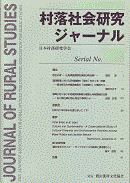Volume 23, Issue 1
Displaying 1-9 of 9 articles from this issue
- |<
- <
- 1
- >
- >|
-
2016 Volume 23 Issue 1 Pages 1-12
Published: October 25, 2016
Released on J-STAGE: October 07, 2017
Download PDF (1104K) -
2016 Volume 23 Issue 1 Pages 13-24
Published: October 25, 2016
Released on J-STAGE: October 07, 2017
Download PDF (1099K)
-
2016 Volume 23 Issue 1 Pages 25-39
Published: October 25, 2016
Released on J-STAGE: October 07, 2017
Download PDF (2955K)
-
2016 Volume 23 Issue 1 Pages 40-51
Published: October 25, 2016
Released on J-STAGE: October 07, 2017
Download PDF (1079K)
-
2016 Volume 23 Issue 1 Pages 52-53
Published: October 25, 2016
Released on J-STAGE: October 07, 2017
Download PDF (631K) -
2016 Volume 23 Issue 1 Pages 54-55
Published: October 25, 2016
Released on J-STAGE: October 07, 2017
Download PDF (645K) -
2016 Volume 23 Issue 1 Pages 56-57
Published: October 25, 2016
Released on J-STAGE: October 07, 2017
Download PDF (618K) -
2016 Volume 23 Issue 1 Pages 58-59
Published: October 25, 2016
Released on J-STAGE: October 07, 2017
Download PDF (630K) -
2016 Volume 23 Issue 1 Pages 60-61
Published: October 25, 2016
Released on J-STAGE: October 07, 2017
Download PDF (643K)
- |<
- <
- 1
- >
- >|
